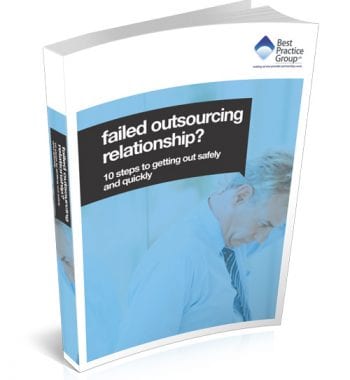 Over the last few years a number of infrastructure and construction solutions organisations have reportedly been experiencing financial challenges, well before the recent pandemic took hold.
Over the last few years a number of infrastructure and construction solutions organisations have reportedly been experiencing financial challenges, well before the recent pandemic took hold.
In recent news, infrastructure giant Costain Construction has also announced a financial rights issue. This will come as no surprise to those in the industry, since last year it was reported that they issued two profit warnings and their share price plummeted.
Major outsourcing businesses go through these highs and lows, such is the nature of the market. However, due to the number of organisations in the sector that have struggled with, or succumbed to, financial strain in recent years, it’s all the more important for clients to maintain a vigilant watch over the diligence conducted in their procurement process and to have a backup plan in place should they need it.
From our experience of optimising the procurement and performance of hundreds of strategic partnerships of this nature, we find there are a number of critical steps to protect your service delivery should your supplier find themselves in a financially challenged or compromised position. Four of these key steps we have listed later in this article.
Some Background to Recent Events at Costain Construction
Costain was founded in 1865 by Richard Costain and Richard Kneen who made a living as ‘jobbing builders and undertakers’. From these small beginnings, a mighty business has grown – first throughout Liverpool, then the rest of the world.
Throughout the twentieth century, Costain grew in house building, railway construction, petrochemicals, coal mining, tunnels and more to become a multi-billion pound leader in its field. However, about a year before the pandemic took hold, and then later that same year, the company issued two separate profit warnings and sent share prices tumbling. According to Google’s Market Summary, the company’s share price, which had been at £3.07 back in July 2019, was by 27 April 2020 languishing at 84 pence after recovering a little from the 3 April low of 35 pence a share.
While Deloitte reported in the 2020 Engineering and Construction Industry Outlook that “In 2019, the engineering and construction industry saw overall market growth, despite cost pressures, labour shortages and trends towards fixed-bid projects”, Costain certainly suffered as a result of its profit warnings. That being said, their share price drop cannot be completely attributed to the profit warnings, as most other businesses outside of the logistics, supermarket and toilet roll sectors have had their own struggles since February this year due to Covid-19.
Costain’s struggles last year were reportedly due to numerous project challenges, including issues on the A465 contract, questions over HS2, delays on the M6 and Preston distributor road, and an arbitration hearing on remedial work to the national synchrotron scientific facility. Bear in mind that it is reported that the company was still winning many ‘significant’ new projects at the same time.
The Rights Issue
The latest news is that Costain is planning a rights issue to raise £100m. Chief Executive Officer Alex Vaughan is reported to have explained that this is for “Strengthening our balance sheet” and “that the cash-raising was also needed to respond to pressure on working capital from cash held in joint operations and project bank accounts”.
Four Steps to Protecting your Service Delivery from the Risk of a Financially Challenged Supplier
If there is one thing that the last few years have taught us, with outsourcing giants having significant financial challenges and this current pandemic bringing businesses to a standstill, it’s that no matter how reliable or stable your supplier may seem, it’s important to have a plan should they let you down for any material reason. Therefore, we’ve put together four of the critical key steps to protecting your service delivery should your supplier enter financially challenged times.
-
- Ensure that your due diligence on the supplier is sound
As you’ll know, one of the key tenets of good practice in procurement is a thorough due diligence process. But how far should you go? The answer is that it will be far easier, and riskier, to do too little than to go too far if you are pushed by haste through unreasonable executive or supplier demands.
One positive way to ensure your efforts to make the right choice are sound is to turn your attention to a prospective supplier’s clients – both current and former. Much can be ascertained from the evidence (not just assurance) they can provide you with of their work together. Examples of this include:
-
- How stable were the employed resources? The number and make-up of skilled personnel will naturally ebb and flow throughout the evolution of a relationship. However, should these resources vary significantly from what would be expected, this is usually something worthy of further investigation. In some relationships, the promised and/or required scale of workforce either does not fully materialise or tails off after a while, as demand on other clients’ projects ramps up and the focus on yours is lost. You will want to be sure that the supplier you select offers the dedication and commitment of resources that you need throughout your relationship with them.
- Do they present the best and deliver far less? Unfortunately, some suppliers will make promises that they will not be able to live up to. It’s the quality of the team(s) that engage in the delivery of your project, not those selling you the dream, that’s important to consider. Clients who have already experienced the reality of delivery from a supplier are best placed to inform you whether a supplier’s commercial trust points are in the positive or negative position.
- Is there consistent investment in innovation? Every client’s aspiration is to instruct a supplier that is truly invested in delivering the best possible outcomes – including innovations and expertise employed to rapidly address issues and solve problems to ensure smoother progress. Current and past clients of a supplier can give you a truer picture of whether this happens in reality and whether it does so consistently throughout its relationship.
-
- Look to your contract
While most service provider contracts will contain express provisions for the possibility of a supplier going into administration or receivership, the vast majority of financially related issues with productivity occur at a lower level than this. From the perception of problems, through minor difficulties to major worries, your supplier will go through many stages before administration in which its financial problems might impact on its ability to deliver service levels in line with contractual obligations.
Of course, not all rights are enshrined in written contracts. Mission-critical services may well be covered under the specialist supplier’s ‘Expert Responsibilities’. If used in the right manner, these ‘Expert Responsibilities’ will prove to be a win-win for the both of you.
With many major strategic relationships stretching over years, the due diligence checks carried out as part of the procurement process can quickly fall out of date. A supplier can enter a financially challenging period at any point in your relationship so it is, therefore, important to ensure that built into your agreement is a mechanism that allows you to review their financial position specific to their ability to deliver on their contractual obligations along with what remedial action you can take to protect the delivery of your services.
It should be remembered through all of this that financial troubles do not necessarily indicate a failing of the relationship. The issues your supplier is facing may be temporary, something they may well overcome in their own time with little or no impact on service delivery. However, it would be prudent to have the mechanisms in place through your contract, to allow you to identify, assess and respond to such a situation, and the knowledge of when and how to implement them.
-
- Know your contingency plan rights
If your supplier is experiencing financial difficulties, then it may well be more than just your project that will suffer. Just like any link in a chain, if they fail, your organisation may also struggle to meet its obligations. It is, therefore, essential that you move quickly to protect mission-critical services and mitigate any potential knock-on effects as soon as you identify such a risk.
This is likely to mean temporarily ‘stepping in’ contractually, to supplement your services through an alternative ‘backup’ contractor for a short or perhaps longer-term period. This will allow you to assess the degree to which the incumbent supplier will be able to fulfil the contract in the medium to long term, but at the same time having contingency arrangements in place to minimise the risk of your services not being delivered appropriately.
As those in the public sector will know, EU procurement rules must be followed. There are presently a number of dispensations where, given the right circumstances, an emergency procurement process under EU law, or direct awards can be applied. This means ‘business as usual’ can usually be maintained in even the most challenging of circumstances. All of this should form part of your contingency plan for each strategic relationship.
-
- Develop your disaster recovery and business continuity plan
You’ll already know that having a disaster recovery and business continuity plan in place is just good business practice. Just like a well-managed backup process can protect your data off-site in case of a disaster in your offices, the addition of an independent service provider available to step in at any point during the relationship should material challenges befall your supplier to assure continued service delivery. Sourcing the right contingency supplier, building commercial trust and relationship equity, and keeping them up to date with progress, will all help you most swiftly and smoothly to transition to them should the need arise.
In Conclusion
This is not the first rights issue Costain has engaged in, and Costain is not the only organisation in the construction sector to call on extra funds from its shareholders to see them through times of choppy water, so this news should be considered in context.
The same should be said about the contracts that were cancelled or delayed last year which led to the profit warnings – these need to be held up alongside new project wins for the business.
However, should your own strategic suppliers find themselves in financial difficulties, then we hope that the four steps outlined above from the critical list of diligence steps to consider in protecting your service delivery will help to supplement your own thinking on how to maintain business as usual, even under the most extreme of pressures.
Free Webinar:
If you’re interested in how to address the 3 big dangers in dealing with strategic suppliers right now and action steps to follow, why not tune into our webinar next Monday at BST 10:30. Click here to claim your spot.
Photo credit: iStock


